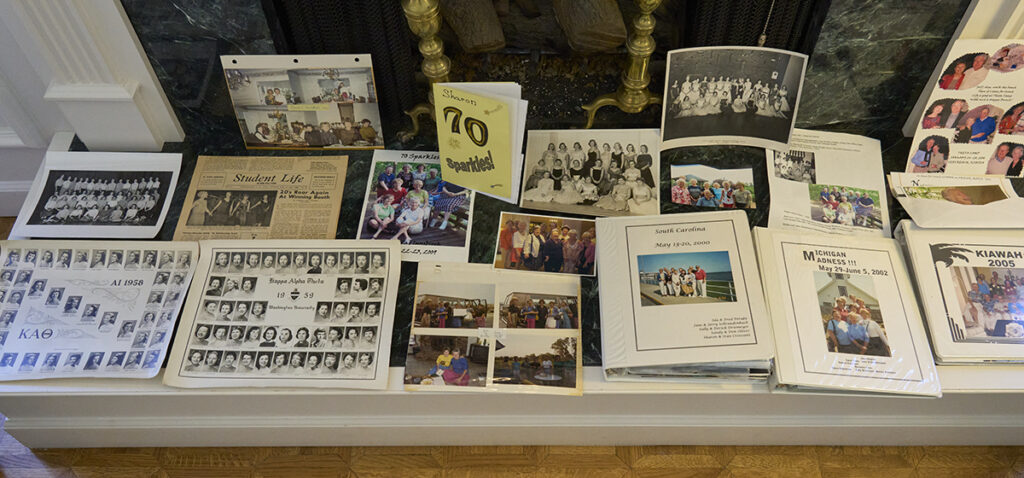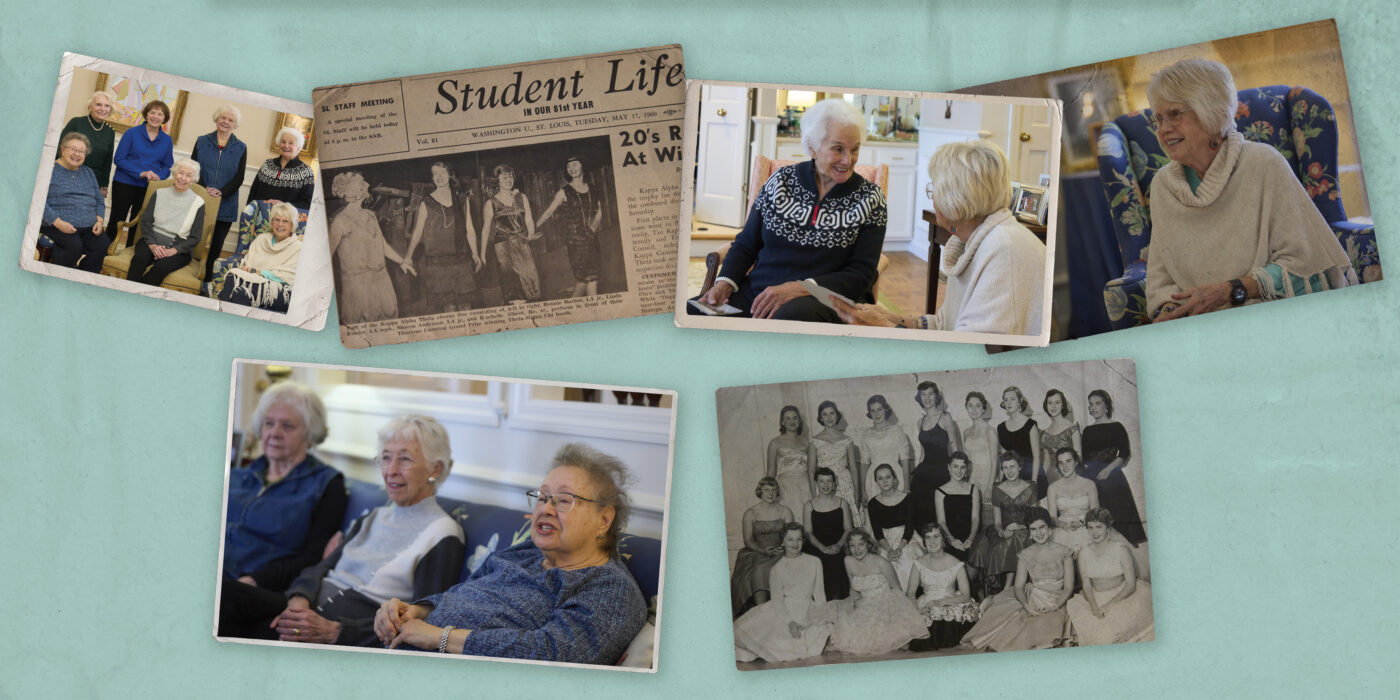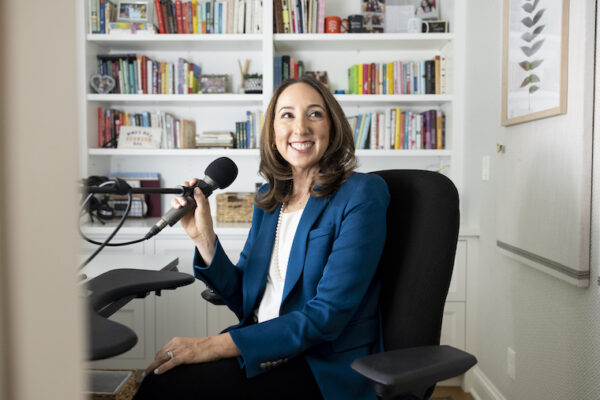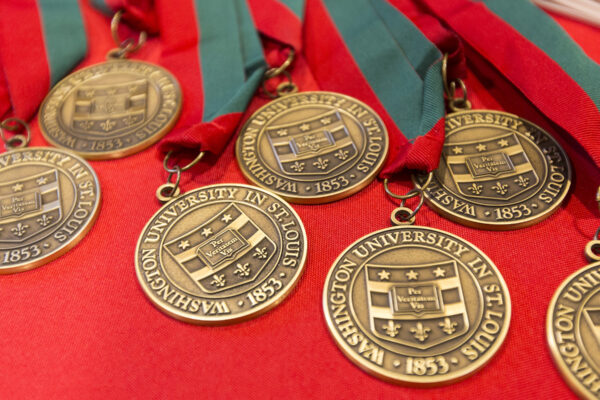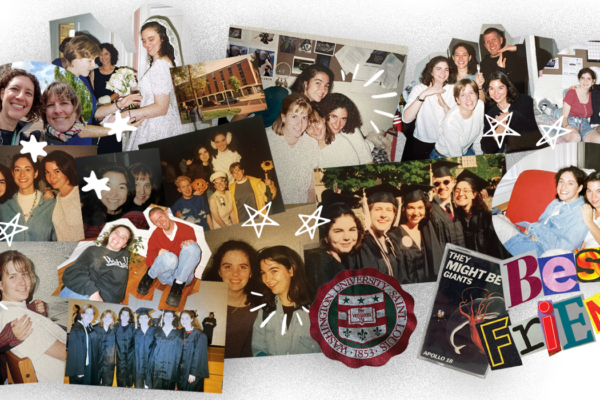Bonnie Barton Wolfarth, AB ’60, is standing at the front door of her suburban St. Louis County home, watching out for and welcoming a visitor on an arctic Friday in January.
“Watch out for that patch of ice on the driveway!” she calls out with a mixture of hospitality and earnestness. She’s in her mid-80s, yet she’s making sure all of her guests arrive safely. A recent winter storm has rendered the St. Louis area an ice rink, but once inside, guests find a home filled with warmth and laughter. The gentle energy of old friends fills the space.
The Thetas, as they still call themselves, are a group of women who forged a deep friendship as sorority sisters on the Washington University campus decades ago, and who simply refused to let it go. Now octogenarians, the group is thriving, and seven of them are sitting in Wolfarth’s living room on this frosty January morning. Neither snow, nor ice, nor global pandemic, nor even time, it seems, can stop the sisters of Kappa Alpha Theta from their monthly meeting.
It’s a gathering that is now in its 66th year. That’s not a typo. Every month since Commencement of 1961, this group of WashU alumnae from the former Alpha Iota chapter have met regularly in one form or another. It started as “The Wednesday Group,” when they would meet to catch up about their lives, their jobs, their burgeoning families. As the years went on, it morphed into family play groups with maybe lunch on the side.
For seven decades now, the group has shared dinners, brunches, family vacations, kids’ weddings, New Year’s Eve lunches and milestone birthdays. They are now, as they laugh, “The-Wednesday-Group-That-Meets-On-Friday.” And they’re not done yet.
In addition to Wolfarth, the women that gathered that day for lunch and camaraderie were Carol Kring Crebs, BSBA ’60; Sharon Anderson Croissant, AB ’61; Barbara Phillips Dammkoehler, AB ’60; Sally Mill Dreimeyer, AB ’61; Rochelle Albert Hicks, BSBA ’60; and Claire Talbot Robertson, AB ’61, MSW ’63. Also part of the group but not present for various reasons are Ida Feldmann Perabo, AB ’61; Sandra Wright Oliver, AB ’61; and Jane Arensmeyer Schraudenbach, AB ’61.
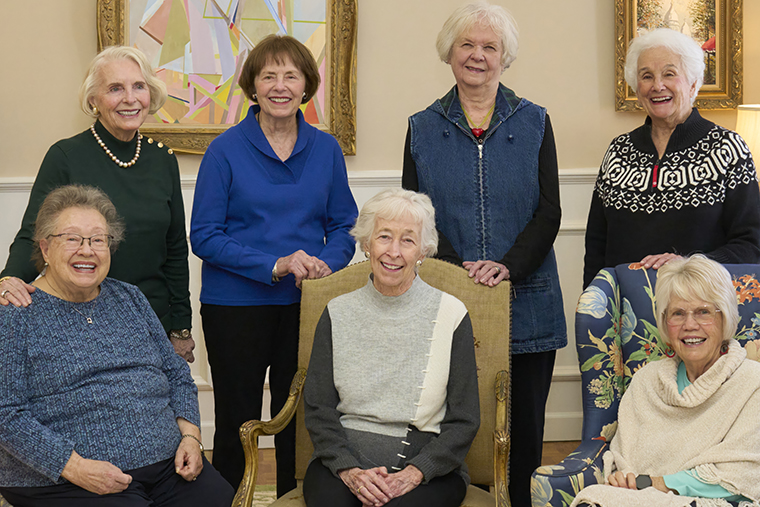
“Almost all of us grew up here in St. Louis and attended Washington U as commuter students,” Croissant says. “I counted it up, and we represent eight different high schools from the St. Louis area. Among the 10 of us we have 20 children, 35 grandchildren and two great grandchildren. And yes, we’ve had a couple of divorces and deaths of our husbands, so it’s hard to count to the exact number of years we’ve been married, but I’ve gotten to 444!
“We were teachers, retail specialists, businesswomen, social workers,” Croissant says. “And we have served as volunteers throughout the community for years. A few of us have been on reunion committees.” That means the first few of them can begin celebrating their 65th reunion at WashU this summer.
“This group of women is too good to be true,” Perabo wrote in an email. “They are free with their laughs, tears, support, meals — whatever is needed, whenever it’s needed. We’ve been together from the time our children walked, all the way to weddings and births of our grandchildren. We have supported each other when our dear friends have died, some way too early. I am fortunate to have such friends.”
Friends who stick together through everything, including tremendous loss, as six of them are widows. “We have a little group within the group called ‘The Merry Widows,’” says Croissant, who lost her husband, Stan, in 2019. “We support each other, go to a play and then out for a nice dinner, and that’s been good. We welcome new members, but we don’t want them, right?”
The dawn of the Second Century
Understanding how this friendship has sustained itself so deeply and for so many years perhaps starts in recalling what the campus was like when the first of them enrolled in 1956. Dwight Eisenhower was president, Elvis Presley had yet to perform “Hound Dog” on The Ed Sullivan Show (he would do so that October), and a streetcar let students off on the northwest corner of what was known as the Hilltop Campus. The majority of WashU students — as many as 70-80 percent, the women estimate — were commuter students from the St. Louis region.
The university had just celebrated its centennial in 1953 and was beginning its Second Century campaign. Dorms that would be named Liggett, Koenig, Umrath and Rubelmann were just being opened on a tract of land south of Forsyth alongside a new student hub called the Wohl Center. A.H. Shepley was chancellor, and, by 1960, construction had begun for a new library north of Graham Chapel.
The campus was expanding, and so was the student body. But according to Beginning a Great Work: Washington University in St. Louis 1853-2003 by Candace O’Connor, it would take until 1964, after these women graduated, for the majority of the students to matriculate from outside the St. Louis area.
For the Thetas, a large room on the second floor of The Women’s Building was their sorority home and the hub of their daily lives, a welcoming place with couches, chairs and tables where they could not only conduct meetings, but study, relax between classes, play bridge or eat lunch in the basement alongside other campus women. Even though they were commuter students, in The Women’s Building, they had each other.
“Without the sorority,” Dammkoehler says. “I would have had a campus without an anchor.”
The campus these women first stepped onto was a lot like the one in this film by Charles Guggenheim, a time capsule of a movie dominated by clean-cut young men in sweaters, carrying their books at the waist to attend classes with professors in suits and ties. In the film, a deep baritone voice narrates their every move.
“Without the sorority, I would have had a campus without an anchor.”
Barbara Phillips Dammkoehler
The Thetas have their own memory of the time, and recall taking classes in big lecture halls, attending dances and social events with fraternities and wearing what they call “normal” clothes for women of the 1950s, which meant skirts or dresses every day. “We weren’t wearing pants,” Croissant says. “It was skirts with knee socks, and either Oxfords or saddle shoes.”
This informal dress code for women was adhered to “even when it was cold,” Dammkoehler adds. “And the campus could get really cold because there weren’t a lot of buildings or tall trees to stop the wind. But by the end of our time here — I think maybe my junior year — society had begun to relax enough to allow women to wear slacks,” she says. “I remember thinking, ‘Gosh, this really makes sense. Why didn’t somebody say we could do this sooner?’”
The fact that they waited for permission speaks volumes about societal norms for the so-called Silent Generation, not part of the Greatest Generation who came of age during the Great Depression and World War II, but too old to be Baby Boomers. A few of the Thetas recall watching with interest the Kennedy-Nixon debate in the fall of 1960 with their boyfriends in a fraternity house, and attending an Assembly Series lecture by Eleanor Roosevelt. And a memory of a standing-room only lecture given by a young writer named Gloria Steinem stands out. Yet while they were college students, many freedoms for women were still a few years away.
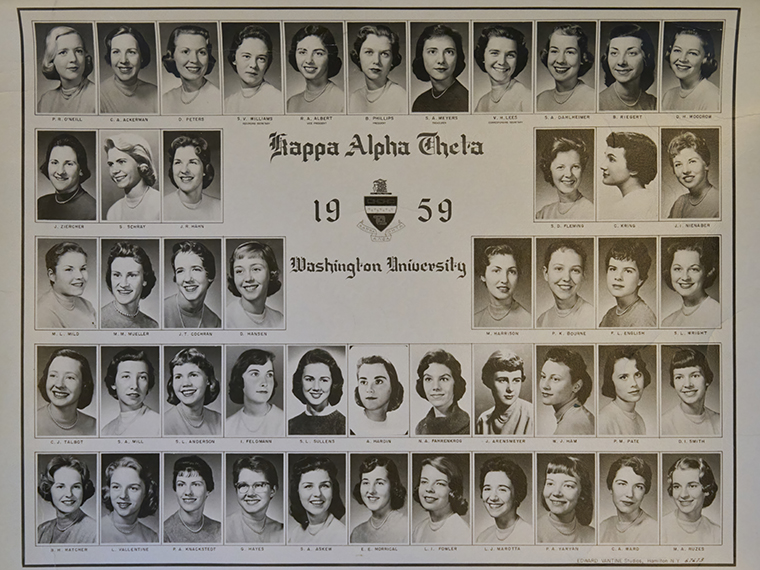
Women understand
After graduation, most of the Thetas worked as teachers, but a few went into advertising, retail buying or social work. “A couple of us went to graduate school right away, but most got married within a year or two of college,” Croissant says. “And then we got to work raising our children. That’s when we’d meet, with our babies crawling on the floor. We relied on each other.”
“I have friends who have asked what it was like to attend college during the 1950s,” says Dammkoehler, who was married for 53 years to Richard Dammkoehler, emeritus professor of engineering, until his death in 2014. “It was a good time, a peaceful time to be coming of age — though we had already experienced some uncertainty as younger children of the 1940s.
“A couple of us went to graduate school right away, but most got married within a year or two of college. And then we got to work raising our children. That’s when we’d meet, with our babies crawling on the floor. We relied on each other.”
Sharon Anderson Croissant
“Then the women’s movement started when we were young mothers, and that threw my thinking into turmoil,” Dammkoehler says. “I wouldn’t have called myself a feminist, nor did I carry a sign in a protest, but the women’s movement did affect my thinking. Did I really need to be dusting furniture or in the kitchen all the time?”
That energy catapulted the friends, once their children were grown, into volunteer work. The group has thrived in their second and third acts and contributed to many community organizations, as detailed by Croissant.
“Bonnie helped start The Churchill School and was named a ‘Woman of Achievement,’ and we have been involved with the Women’s Connection Network,” she says. “We’ve worked with special needs and as gospel singers, at Powder Valley Conservation Nature Center, at the Frank Lloyd Wright House in Ebsworth Park, the Miriam Switching Post and with Afghan refugees through the International Institute. I think that there’s this spirit among us that even though we are in our 80s, we can still go out and contribute to our community. I love that.”
Through life’s ups-and-down, this group of St. Louis natives has had each other. And without WashU, they might never have met. “It took me years to realize what an advantage this was for us,” Dammkoehler says, referring to the fact they all grew up — and stayed, mostly — in the St. Louis area. “My daughter [Ann Dammkoehler Spangler, AB ’89] went to WashU in the 1980s, and while she made great friends too, they were from all over the country and scattered after graduation. They don’t have this.”
This is women who hold each other up, women who “understand,” as Gloria Steinem once wrote about women’s friendship. Women will “share experiences,” Steinem wrote, “make jokes, paint pictures, and describe humiliations that mean nothing to men, but women understand.”
“We track each other’s well-being, provide emotional and physical support (including food when needed), and have gone on some hilarious and worthwhile trips and ventures,” Robertson says. “We look forward to the regularity of getting together and getting old together while truly enjoying each other’s company.”
“I am so fortunate to have such friends,” Perabo wrote. “I wish for all students at Washington U to find such friends and also to appreciate the education they are getting — which will open so many doors for future learning.”
Says Croissant: “We’ve just had good lives because of each other.”
